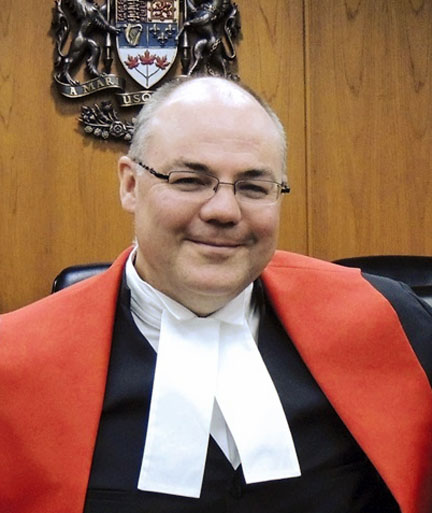
In what many are calling a controversial and conservative choice, Prime Minister Stephen Harper has appointed Alberta judge Russell Brown to the Supreme Court of Canada, replacing Justice Marshall Rothstein.
 The appointment is effective Aug. 31 when Rothstein will be stepping down. Rothstein was appointed to the SCC on March 1, 2006.
The appointment is effective Aug. 31 when Rothstein will be stepping down. Rothstein was appointed to the SCC on March 1, 2006.
“I’m a fan,” says Craig Jones, professor of law at Thompson Rivers University in Kamloops, B.C. “I think it’s a great long-term appointment.”
Brown, a former associate dean at the Faculty of Law at the University of Alberta, was a guest lecturer at TRU in February. Jones and Brown share an academic interest in what Jones calls “the very sticky field of causation in tort law.”
Associate professor Margaret Hall of the Faculty of Law at Thompson Rivers University called Brown “a truly outstanding scholar.”
“I have known Russell Brown since young and carefree undergraduate days at UBC. To my delight, we both grew up to become torts professors and became re-acquainted with each other in that professional and intellectual capacity,” she says.
While there’s some criticism that Brown has been a judge for just 2.5 years, others note he’s not the first to have an expedited path to the SCC.
Chief Justice Beverly McLachlin was appointed at the age of 45 (Brown is 50), and both with experience from private practice and academia, says Eugene Meehan of Supreme Advocacy LLP in Ottawa and a former executive legal officer at the SCC.
“With the court’s current workload mainly criminal, he will adjust, but his academic experience of critically analyzing and writing about the law will serve him well,” says Meehan.
He adds Brown’s time as an associate dean will help him in terms of “building relationships and putting out fires.”
University of Alberta law school professor Peter Sankoff says Brown’s varied background will benefit the SCC.
“Anytime someone makes a rapid rise to the Supreme Court there’s always controversy and it’s not unprecedented,” says Sankoff. “Sometimes having someone who has done a lot of different things and then moves to the judicial ranks in a short time can bring different perspectives to the bench.”
Sankoff, a professor and author of criminal law, wouldn’t comment on whether Brown has “conservative” leanings, saying rather he sees him as “a guy with an open mind.”
“I’ve read a lot of his decisions on the bench and I’m reluctant to peg him as an ideologue of one sort or another,” he says. “What surprised me was how rigorous and well thought out a lot of his criminal law decisions [are]. It doesn’t’ mean I agreed with every one of them but at the end of the day I couldn’t deny they were well thought out.
“He is a hard working guy. I think he has a strong will and strong thought about things but I know he’s open.”
Brown was appointed to the Court of Appeal in Edmonton last year after just 13 months on the Court of Queen’s Bench. He also serves as a judge of the Court of Appeal for the Northwest Territories and a judge of the Court of Appeal of Nunavut. He previously served on the Court of Queen’s Bench of Alberta.
Before being appointed to the bench, Brown served as an associate professor and associate dean at the University of Alberta Faculty of Law. He was also associate counsel with Miller Thomson LLP in Edmonton and practised at Carfra & Lawton LLP and Davis & Co. (now DLA Piper LLP) in Vancouver.
Brown’s appointment has also raised eyebrows in part due to his connection as an adviser in 2012 to the Justice Centre for Constitutional Freedoms, a conservative legal group.
“He was a very well regarded lawyer and he is an excellent teacher,” says Jones. “What makes him a great judge is he is an extremely down to earth, pragmatic, very human guy and he brings that, notwithstanding people’s concerns about this or that connection to the JCCF.”
Sankoff says judicial labels get thrown around a lot and there are different types of conservatives. His view is Brown has a “healthy respect for judicial precedent” which he says is the traditional view of a conservative.
“He has a healthy respect for the rule of law and precedent and that’s a welcome trait to add to the Supreme Court. That is what conservative used to mean. That can be both good and bad.”
Jones predicts Brown will be “leading some advances in less spectacular but very important areas of the law” such as tort law.
“While it [tort law] hasn’t been neglected, the approach of the Supreme Court of Canada has been tentative and inconsistent. I think he has a very strong understanding of the sort of ebbs and flows of the tort jurisprudence and a way of harmonizing it into a concept that serves social objectives and maintain some intellectual integrity,” he says.
“He has a really good way of boiling things down to common ideas and looking through threads of cases for some sort of conceptual integrity and often nails it.”